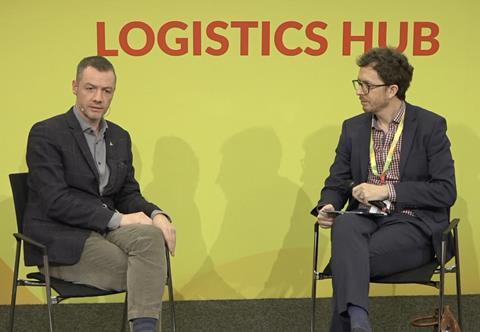Steve Alaerts of Foodcareplus Logistics sat down with Fruitnet’s Michael Barker at the Logistics Hub to discuss improving the resilience of international fresh produce supply chains

How would you assess where we are currently at? How difficult a moment is this for the fresh produce industry and how precarious is supply right now?
Steve Alaerts: I think we really have to start realising that this is going to be a permacrisis. We are constantly going to have challenges, especially when it comes to infrastructure. A lot is impacted by climate effects, as well as geopolitics, labour issues, strikes, and all other aspects.
We are going to have to go into a future world where we assume that we cannot be too dependent on infrastructure or supply chains in certain matters, and start building contracts where we hire different types of solutions in order to reach certain markets.
Yes it’s going to increase the costs in general, but in time, that will flatten out.
Let me give you an example. When at the port of Cape Town there are issues, people start realising that they need to use another gateway to get their fruit out. So they look at other solutions, such as trucking it to Namibia and shipping it out of a port there.
But what happens is, everyone starts doing that, and the infrastructure there is too small to cope. So, people start investing in that infrastructure, and there is now a solution for shipping produce out. In the end, the worst thing is produce being wasted.
So what you are saying is that we need more flexibility in the supply chain? And isn’t flexibility quite hard to implement when other transportation may not be readily available?
SA: Yes, we need flexibility. This is not a new thing, although maybe it is a little newer in fresh produce, which is weird because it’s most necessary in fresh produce because of the short shelf-life.
For example, in the automotive industry, it’s very common. If you have a factory that is assembling cars and you have parts that are missing, the factory stops. So they have these types of contracts and transport solutions in place, because they expect or anticipate problems from things like the weather, which could lead to vessels arriving a week later. They start utilising other modes of transport.
What I’ve really disliked over the last couple of months – and I do understand that Europe wants to be a leader when it comes to becoming greener – is that the retail sector in Europe has been very quick to de-promote airfreight. I think this is a little bit unjust.
Of course the airfreight industry needs to invest in more sustainable aviation, fuel, other solutions, and ultimately they will get there. But now they are saying that airfreight is not the right mode of transport? I would say that has recently not been the case.
Foodcareplus operates in a range of different food segments, not just fresh produce. From the other sectors that you cover, what can our industry learn and benefit from?
SA: What I find compelling is that there is still so much volume being handled in the same way that we handled it 30 or 40 years ago. There is so much technology out there to help us with planning, and I know many people talk about how we can use generative AI to create better planning solutions, because it is a complicated matter.
But a lot of the things that are already used in other industries when it comes to planning software, monitoring of cargo and these types of solutions, are still not used in many of these [fresh produce industry] flows because of the so-called price tag.
We still see very weird situations where monitoring may be used, but no-one does anything with the data. They don’t make informed decisions with the information that has been collected. The fresh produce industry should start taking this very seriously and invest more in tools that will help them to get a better market for their products.



